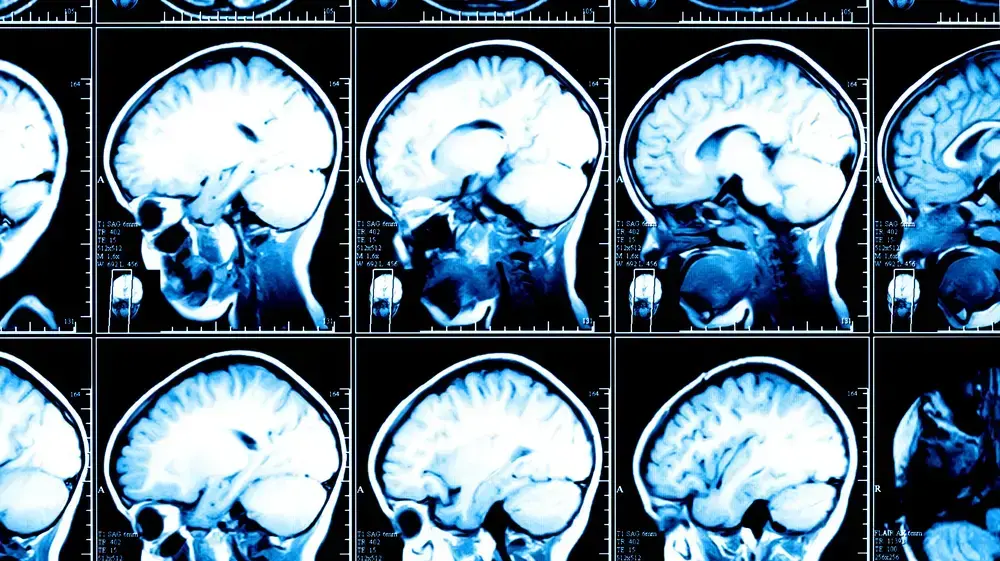Members of a choir, during a performance on May 20 in Pamplona. Eduardo Sanz (Europa Press)
Professor Teppo Särkämö studies how aging affects the brain's processing of the act of singing, which could have important therapeutic applications.
“We know a lot about speech processing, but not so much about singing.
We are studying the fact that certain functions related to singing are preserved in people with a multitude of neurological diseases”, he explains.
Expressing yourself can be an almost impossible task for people with aphasia, a disease usually caused by a stroke that seriously affects the ability to communicate, since it is very difficult for them to articulate the correct words.
However, applying a technique known as "melodic intonation therapy", which consists of asking the person to sing a habitual sentence instead of saying it, they surprisingly manage to make the words come out.
Särkämö is the coordinator of the PREMUS project and, together with his team, uses similar methods and extends this strategy by creating “senior choirs” specifically aimed at aphasia patients and their families.
Scientists thus explore the potential of singing as an important rehabilitation tool in cases of aphasia, and perhaps also to prevent cognitive decline.
Hit the right notes
The PREMUS study is carried out in coordination with a local Helsinki association dedicated to aphasia, and involved several choirs, each consisting of about 25 people with aphasia and their family caregivers.
The results of the tests carried out are promising.
“Ultimately, the goal of our work with people with aphasia is to use singing as a tool to exercise speech production and eventually communicate without the need to sing.
However, in choirs we are seeing the effect this intervention has on people's daily lives as an essential communication tool,” says Särkämö.
In addition to the choir of people with aphasia, the team has done a large number of functional magnetic resonance imaging (fMRI) scans of the brains of young, middle-aged and older people who sing in choirs to find out why this activity is so important at different stages of life. life.
The results suggest that, with age, the brain networks involved in singing undergo fewer changes than those responsible for speech, which seems to indicate that singing has a more global effect on the brain and suffers less deterioration with age.
His studies also show that it is essential to sing actively and not just listen to choral music, for example.
"When you sing, the frontal and parietal systems of the brain, responsible for regulating behavior, are activated, and more motor and cognitive resources associated with verbal control and executive functions are used," says Särkämö.
Initial results from a longitudinal study comparing the neurocognitive function of senior choir members and other healthy older adults (who did not sing) show the positive effects of singing on cognitive and auditory function and importance of the social interaction associated with this activity, which could delay the onset of dementia.
Choir members performed better on neuropsychological tests, reported fewer cognitive difficulties, and enjoyed greater social integration.
Electroencephalograms performed on the same groups indicate that the choir members possessed more advanced high-level auditory processing capabilities that enabled them, in particular, to combine information about pitch and location in the frontotemporal regions of the brain, something that Särkämö attributes to the complexity of the sound environment that occurs in a choir.
The next step will be to reproduce and extend this work with choirs of elderly people diagnosed with Alzheimer's, as well as to develop a large-scale clinical trial to test the effects.
However, the difficulties are probably different in the case of Alzheimer's disease: patients can remember songs from their past, but Särkämö is not sure that they can learn and remember new lyrics.
He is both optimistic and realistic about his work.
“It is about trying to stimulate the networks that remain active in the brain.
We believe that singing can help restore some of these functions, although given the devastating progressive deterioration that Alzheimer's causes, the only thing that can be hoped for is to buy time and try to slow down the rate of decline that is already occurring.
the same sheet music
Christian A. Drevon, professor of medicine at the University of Oslo, Norway, is also dedicated to solving the problems facing an aging population.
Drevon is a biomarker specialist and, within the EU-funded Lifebrain project, is using his knowledge to understand the different factors that affect neurocognitive function.
"Most studies on Alzheimer's are cross-sectional: you take a group of people, examine a specific moment and associate certain things with those who do and do not have the disease," he explains.
“However, there is often no causality;
It cannot be known if it is the cause of the disease or a consequence of it”.
To truly understand how Alzheimer's and dementia work, you need data from people before and after they get sick, so you can identify what triggered it.
Unraveling this question is the main objective of the Lifebrain project, coordinated by psychology professors Kristine Walhovd and Anders Fjell.
Within the framework of this initiative, brain MRI data from people across Europe have been collected to analyze the importance of a series of factors for cognition as we age and how they vary from person to person.
Before being able to analyze more than 40,000 brain MRI images from more than 5,000 people between the ages of 18 and 80, it was necessary to harmonize the data.
Do the MRI scanners from Sweden and Spain offer the same results?
To make sure this is the case, Lifebrain sent eight participants to different parts of Europe to undergo a scan and adjust the equipment based on the results.
All psychological tests (including cognitive tests) and other data collected (body weight, demographics, genetics, and lifestyle data such as sleep and diet) were harmonized.
The team then cross-referenced the IRM data with other databases and uncovered new evidence of the importance of where you live and access to green space in reducing dementia risk.
Education and sleep, in contrast, were also found to be less correlated with future dementia risk than previously thought.
“Many studies argue that education is very important in reducing the risk of dementia.
But if you follow up longitudinally throughout people's lives, you don't see such an association,” explains Drevon.
“This does not mean that education is not important, but it is probably not true that it can prevent the onset of dementia.
We must look for other determining factors.”
Given the high cost of MRIs, Drevon suggests using small blood samples (dried blood spots) drawn from the finger with the help of a lancet, without professional assistance, to obtain individual data in the future.
These samples would be tested by a laboratory such as Lifebrain partner Vitas Ltd, and could be instrumental in providing personalized online advice on individual risks.
“If we want to really get a better lifestyle, personalization is probably the way to go.
It is necessary to measure several factors of each person throughout their life, ”she points out.
"The best thing we can do to combat cognitive decline and dementia is to take early preventive measures, and for that you need this kind of data throughout life."
exercise songs
Professor Drevon hopes that, over time, this personalized information could help delay, or perhaps eradicate, certain aspects of dementia.
In the meantime, why not sing to prevent cognitive decline, as proposed by Särkämö and the PREMUS project?
Do you agree that singing could be an important preventative measure?
“The brain is like a muscle.
If you train, you tone it up, like when you use it to sing: it is a complex task that involves many processes and requires retention.
There are, of course, other ways to train the brain, but singing is a great example of an activity that can help improve brain function,” he says.
Article originally published
in Horizon
, the European Union Research and Innovation Magazine.
You can read the English version
here
.
You can follow
EL PAÍS SALUD Y BIENESTAR
on
,
and
.

/cloudfront-eu-central-1.images.arcpublishing.com/prisa/7FDXBGZ5SJEH5FTFUUID67CG6I.jpg)












